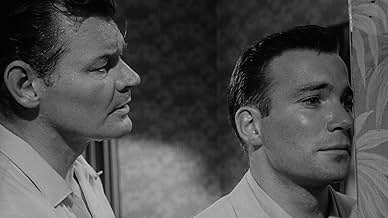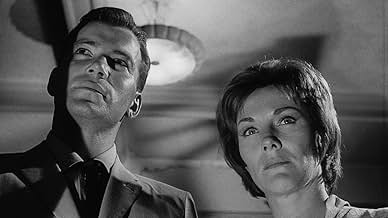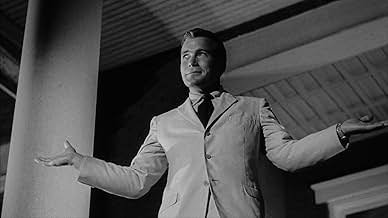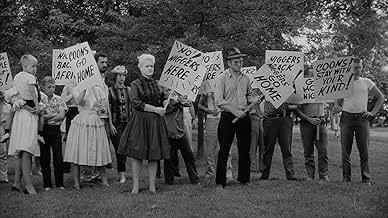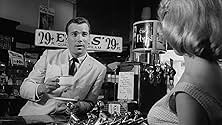Aggiungi una trama nella tua linguaA charismatic "social reformer" rallies the white populace of a Southern town to oppose school integration, but he soon finds himself in a situation that he cannot control.A charismatic "social reformer" rallies the white populace of a Southern town to oppose school integration, but he soon finds himself in a situation that he cannot control.A charismatic "social reformer" rallies the white populace of a Southern town to oppose school integration, but he soon finds himself in a situation that he cannot control.
- Bart Carey
- (as William Nolan)
- Jack Allardyce
- (as O.C. Ritch)
- Old Hotel Clerk
- (voce)
- (partecipazione non confermata)
- Billy Lee
- (non citato nei titoli originali)
Trama
Lo sapevi?
- QuizAfter the crew was thrown out of East Prairie, MO, by the chief of police (for allegedly being "communists"), Roger Corman realized that he needed one more wide shot of the high school. He and an assistant went back into the town and hurriedly filmed the shot. The chief must have gotten wind of his being there, as he was seen by Corman arriving in the distance. Corman and his assistant quickly threw the camera and equipment into their car, and sped away in the opposite direction, unscathed.
- BlooperAt the beginning of Adam Cramer's speech in front of the town hall, he unbuttons his jacket twice.
- Citazioni
[last lines]
Sam Griffin: [to Adam Cramer] Boy, you're gonna get grass stains all over those trousers you don't get up. Come on. That's better. I figure your work in this town's about over. If you hurry, you can catch the bus to Farragut. They got trains there. If you're a little light on travelin' money, I'd be proud to... You're sure, now? Oh, I almost forgot. These belong to you. I wouldn't wanna steal from you, boy.
- ConnessioniFeatured in Some Nudity Required (1998)
This is Corman's most painstakingly worked-out film, which is why it is so powerful, suggesting, like Lang, a set of mathematical propositions that seem simple but, add up to a theorem that seems to negate mathematical principles of logic, order etc. As in a Lang film, there is no 'hero' to root for - the lead here is a sinister right-winger linked to the KKK who arrives in an archetypal Southern town to stir up race hatred. He is given the conventional Hollywood hero treatment: the opening credits set up his point of view, establishing his way of looking at the world.
But even over these credits, Corman confuses us. At first we think he's a solitary figure, it is him alone we see entering the town and looking at it. Then he comes out with a woman and child, and we assume he's a family man, but that turns out to be wrong too. So, in these opening scenes we are presented with a lead character in the conventional manner, but, unconventionally, we are unable to get a grip on him.
Similarly, in spite of the title and the menacing opening music, Cramer's good manners and charm continue to suggest him as a hero, even though he is trying to stir up racist feeling, especially when compared to the next significant male character, a loud braggart who appears to be raping his nymphomaniac wife. In this first third, there are no sides drawn, we might almost be watching a racist film, such is Cramer's conventional heroic status. He even seems a movie star, with his dark shades and good looks, which Corman plays on ironically in the scenes of demagogary and when his 'fans' protest his jailing.
Like Lang, Corman switches point of view disturbingly and decisively. This opening out of point of view makes clear the issues, and in a way that conventional Hollywood cinema of the time could not conceive. The reason films like this were considered 'B' or exploitation is because they were telling truths that official Hollywood didn't even know existed. How many contemporary Hollywood films were even dealing with these issues, never mind as provocatively and intelligently as this one? When they finally got round to it, it was cosy liberal kramergloop.
There is no flip solution here - the moral centre is a moderate racist who is nearly killed for his growing ethical awareness (the newspaper editor) - other liberals are shown to be almost criminally useless. Corman asks questions with no easy answers - how do you enforce progressive laws? how do you hold back a mob without becoming as reactionary as them? Cramer, influenced by Lenin as much as Hitler, makes his appeals to democracy and freedom, and Corman forces us to admit that he is right, to reconsider what we mean by these concepts. This is a stunning film, full of tense calm giving onto explosions of harrowing violence, with an insight into its roots in sexual neurosis, including a sequence where the KKK come into town like an invading army, a huge cross like a tank turret, ready to be burned; a lynch sequence as shocking as Huck Finn or 'The Ox-bow Incident'.
Along with the unusual, Langian clarity of the monochrome imagery, note the grids on or around Cramer - crossed telegraph wires, the bars of the hotel lobby etc. - culminating in the demand for the accursed rapist behind a grilled window, like a frothing beast; or the childlike immaturity of the racists, whose hatred centres around the school's swing. The frightening 'speech' scene, outside a monumental civic building, in Nuremberg-like lighting, is more potent than anything in 'All the King's Men'.
- the red duchess
- 22 dic 2000
- Permalink
I più visti
- How long is The Intruder?Powered by Alexa
Dettagli
Botteghino
- Budget
- 90.000 USD (previsto)
- Tempo di esecuzione1 ora 24 minuti
- Colore
- Mix di suoni
- Proporzioni
- 1.85 : 1
Contribuisci a questa pagina



